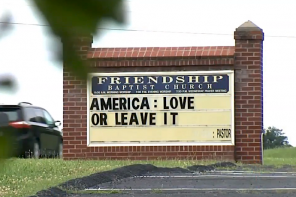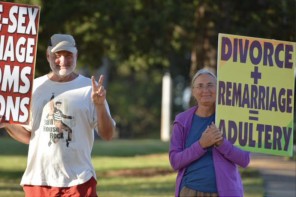Although the following post stands on its own Part I can be read here.
The report issued by the Brookings Institution last week concluded that while religion is strong in America (people care much about the religion of the president, their views about how to help the poor are rooted in religion, and they hold fast to the idea that America has a special role n God’s plan for history for history) it was not an important factor in the recent election.
The report, authored by Brookings fellows E.J. Dionne and William Galston, claims that the election was about “economics” rather than “religion” because when people were asked in a post-election survey what was most the most important factor in their vote, 47% said the economy, while only 3% said same sex marriage or abortion (respectively). The analysis provides no reason given why those two social issues should be considered “religious” and the other issues not — that is merely a well-worn assumption.
The other issues that ranked high in voters’ assessments of what determined their choices, like “the size of government” and “health care,” were deemed “not religious.” But for conservatives “the size of government” and their opposition to health care are one and the same (raising that number to a close second choice for the most important factor at 37%) and they are decidedly religious. The report indicates that evangelicals’ concerns about the economy focused on the debt, which has clearly been framed in religious terms, as I reported here.
In fact, to the degree that voters believe the problems in the economy are a result of ways in which government has overstepped its appropriate limitations (which so many of them do), these three issues are joined and all have religious undertones. One can also imagine that for liberal Christians support for health care could also be religious, though it was treated in the analysis as though it was not.
The Brookings data documents the influence of religious belief on views of American exceptionalism but somehow Dionne and Galston look right past that data when concluding religion played little role in the mid-terms. The view that God had a hand in the founding of the country, especially in the writing of the Constitution and the limited government conservatives believe it establishes, is exactly the way in which conservatives understand the “proper” role of government.
On a point that is even more telling, the report notes: “A majority of Americans see religion as the solution for social ills. Fifty-six percent mostly or completely agreed with the statement that ‘If enough people had a personal relationship with God, social problems would take care of themselves.'”
Candidate, now Senator-elect Rand Paul, made such a statement. According to the survey, 73% of Republicans (82% of Christian conservatives) agree with him. Dionne and Galston continue:
This suggests a classic divide deeply rooted in American history—It is a division between those who see social problems as caused primarily by individual shortcomings and those who see such difficulties as arising mainly from social and structural injustices. Yet if a majority saw personal relationships with God as key to resolving social problems, a narrow majority, of 52 percent to 45 percent, rejected the statement that “government is providing too many social services that should be left to religious groups and private charities.” Responses to this question appear to have been shaped more by attitudes toward government and its proper role than by an assessment of the work of the religious or non-profit groups.
So Dionne and Galston present evidence for the persistent influence of religion in America, but conclude, paradoxically, that religion seems not to have mattered in this past election, because they focused so narrowly on what constitutes “religious” issues. But the data they relied on actually show a profound influence of religion in the current American political landscape. The authors’ interpretation inadvertently obscures the influence as a result of the way they divide up categories and assume religiosity or deny its presence.
But even more important, I think, was the way in which polling data is often received as though it is objective and scientific while on-the-ground qualitative research is perceived of as “subjective.” Certainly the subjectivity of field research is more obvious. But I question the degree to which complex webs of meaning and construction can be measured by the kinds of questions that are necessary to draw quantitative conclusions.




